University Business Communication Reflection: Internship Experiences
VerifiedAdded on 2020/05/08
|8
|2200
|259
Report
AI Summary
This report presents a student's critical self-reflection on their business communication skills, primarily focusing on experiences during an internship. The student identifies key weaknesses, including introverted tendencies, difficulty with self-control and empathy, lack of motivation, and poor listening skills. These shortcomings manifested in various situations, such as difficulties in team assignments, conflicts with colleagues, and challenges in meeting deadlines. The report explores the importance of emotional intelligence, self-regulation, empathy, and active listening in effective business communication. To address these weaknesses, the student proposes strategies such as practicing self-awareness, understanding different perspectives, taking responsibility for actions, setting achievable goals, and actively improving listening skills through workshops and mentorship. The overall goal is to develop into a more skilled and successful business professional by enhancing communication and emotional intelligence.
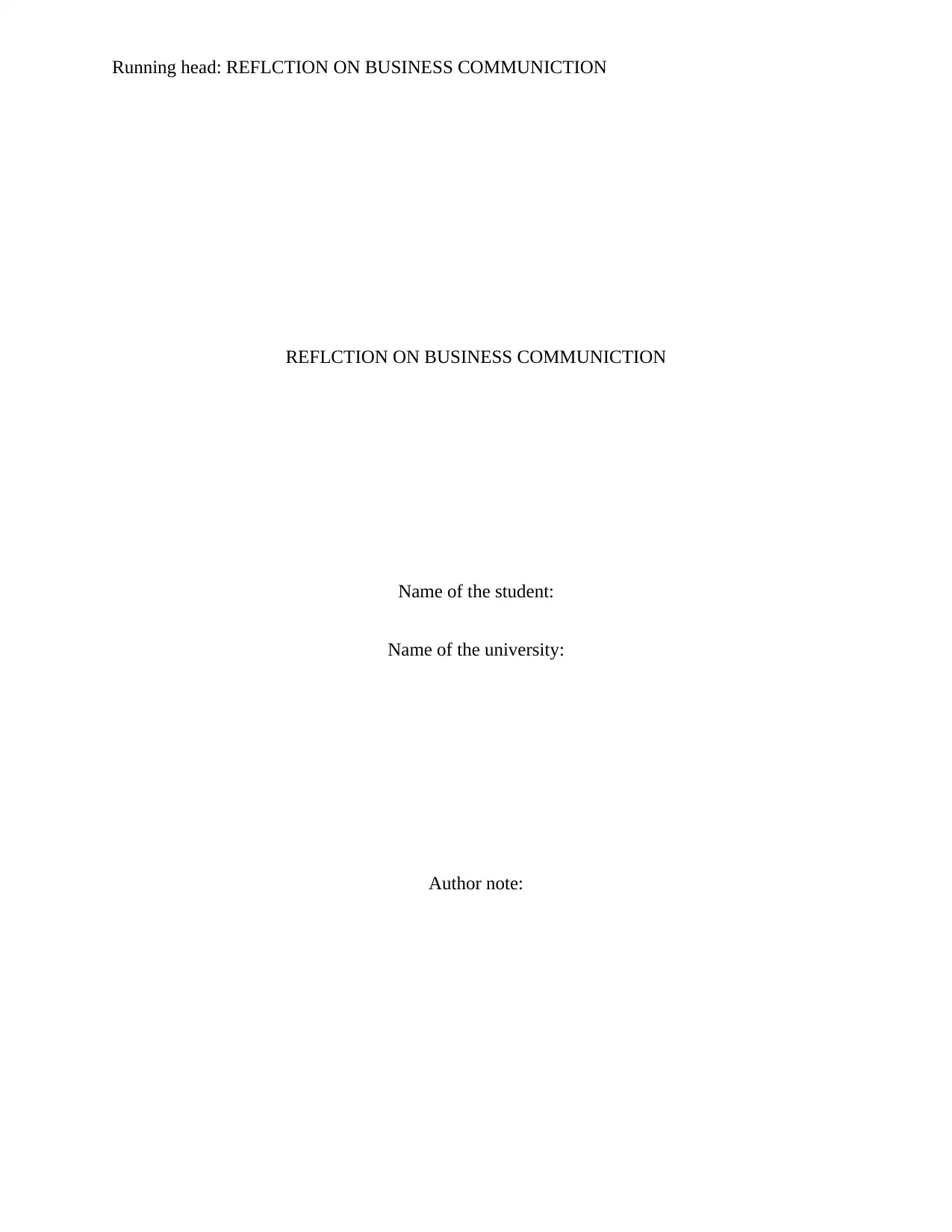
Running head: REFLCTION ON BUSINESS COMMUNICTION
REFLCTION ON BUSINESS COMMUNICTION
Name of the student:
Name of the university:
Author note:
REFLCTION ON BUSINESS COMMUNICTION
Name of the student:
Name of the university:
Author note:
Paraphrase This Document
Need a fresh take? Get an instant paraphrase of this document with our AI Paraphraser
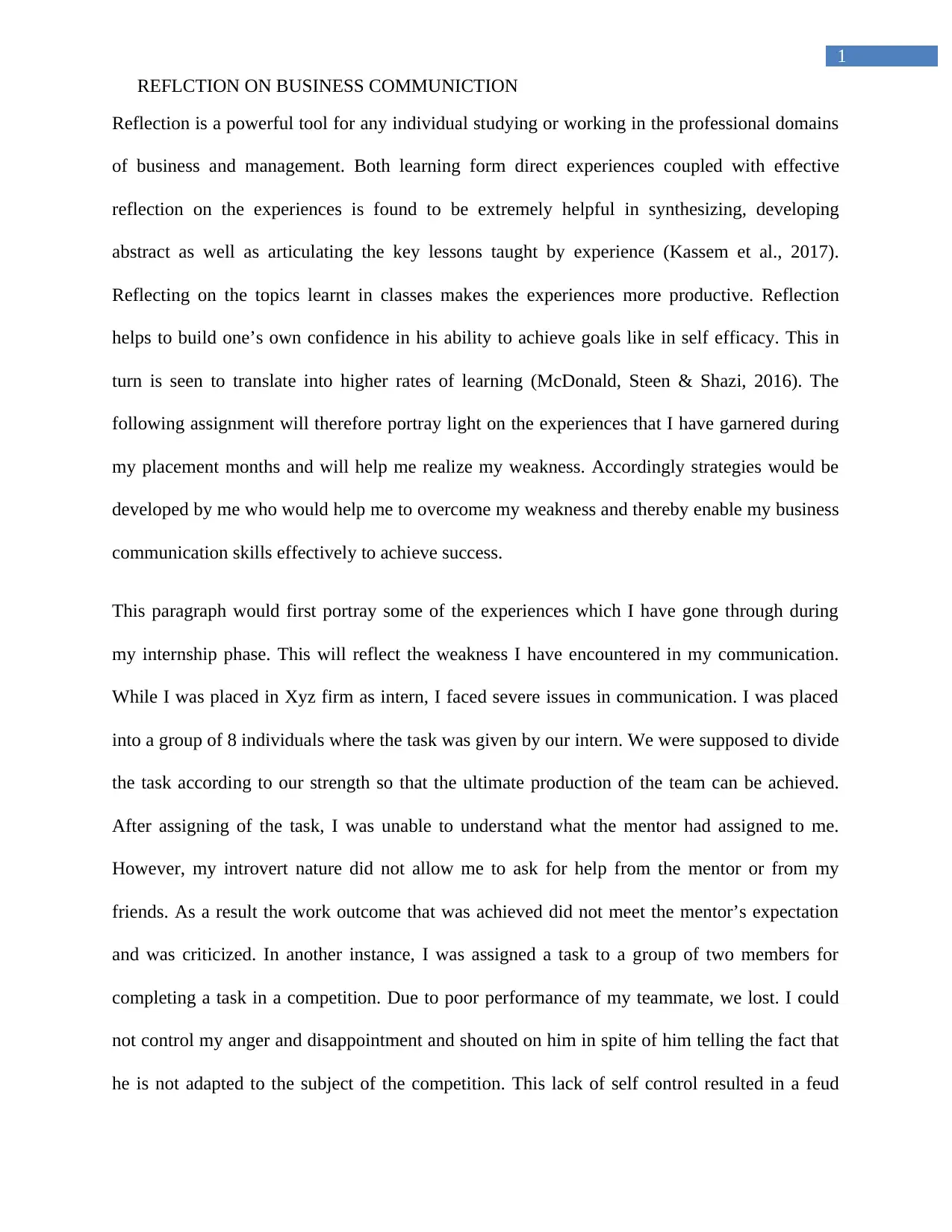
1
REFLCTION ON BUSINESS COMMUNICTION
Reflection is a powerful tool for any individual studying or working in the professional domains
of business and management. Both learning form direct experiences coupled with effective
reflection on the experiences is found to be extremely helpful in synthesizing, developing
abstract as well as articulating the key lessons taught by experience (Kassem et al., 2017).
Reflecting on the topics learnt in classes makes the experiences more productive. Reflection
helps to build one’s own confidence in his ability to achieve goals like in self efficacy. This in
turn is seen to translate into higher rates of learning (McDonald, Steen & Shazi, 2016). The
following assignment will therefore portray light on the experiences that I have garnered during
my placement months and will help me realize my weakness. Accordingly strategies would be
developed by me who would help me to overcome my weakness and thereby enable my business
communication skills effectively to achieve success.
This paragraph would first portray some of the experiences which I have gone through during
my internship phase. This will reflect the weakness I have encountered in my communication.
While I was placed in Xyz firm as intern, I faced severe issues in communication. I was placed
into a group of 8 individuals where the task was given by our intern. We were supposed to divide
the task according to our strength so that the ultimate production of the team can be achieved.
After assigning of the task, I was unable to understand what the mentor had assigned to me.
However, my introvert nature did not allow me to ask for help from the mentor or from my
friends. As a result the work outcome that was achieved did not meet the mentor’s expectation
and was criticized. In another instance, I was assigned a task to a group of two members for
completing a task in a competition. Due to poor performance of my teammate, we lost. I could
not control my anger and disappointment and shouted on him in spite of him telling the fact that
he is not adapted to the subject of the competition. This lack of self control resulted in a feud
REFLCTION ON BUSINESS COMMUNICTION
Reflection is a powerful tool for any individual studying or working in the professional domains
of business and management. Both learning form direct experiences coupled with effective
reflection on the experiences is found to be extremely helpful in synthesizing, developing
abstract as well as articulating the key lessons taught by experience (Kassem et al., 2017).
Reflecting on the topics learnt in classes makes the experiences more productive. Reflection
helps to build one’s own confidence in his ability to achieve goals like in self efficacy. This in
turn is seen to translate into higher rates of learning (McDonald, Steen & Shazi, 2016). The
following assignment will therefore portray light on the experiences that I have garnered during
my placement months and will help me realize my weakness. Accordingly strategies would be
developed by me who would help me to overcome my weakness and thereby enable my business
communication skills effectively to achieve success.
This paragraph would first portray some of the experiences which I have gone through during
my internship phase. This will reflect the weakness I have encountered in my communication.
While I was placed in Xyz firm as intern, I faced severe issues in communication. I was placed
into a group of 8 individuals where the task was given by our intern. We were supposed to divide
the task according to our strength so that the ultimate production of the team can be achieved.
After assigning of the task, I was unable to understand what the mentor had assigned to me.
However, my introvert nature did not allow me to ask for help from the mentor or from my
friends. As a result the work outcome that was achieved did not meet the mentor’s expectation
and was criticized. In another instance, I was assigned a task to a group of two members for
completing a task in a competition. Due to poor performance of my teammate, we lost. I could
not control my anger and disappointment and shouted on him in spite of him telling the fact that
he is not adapted to the subject of the competition. This lack of self control resulted in a feud
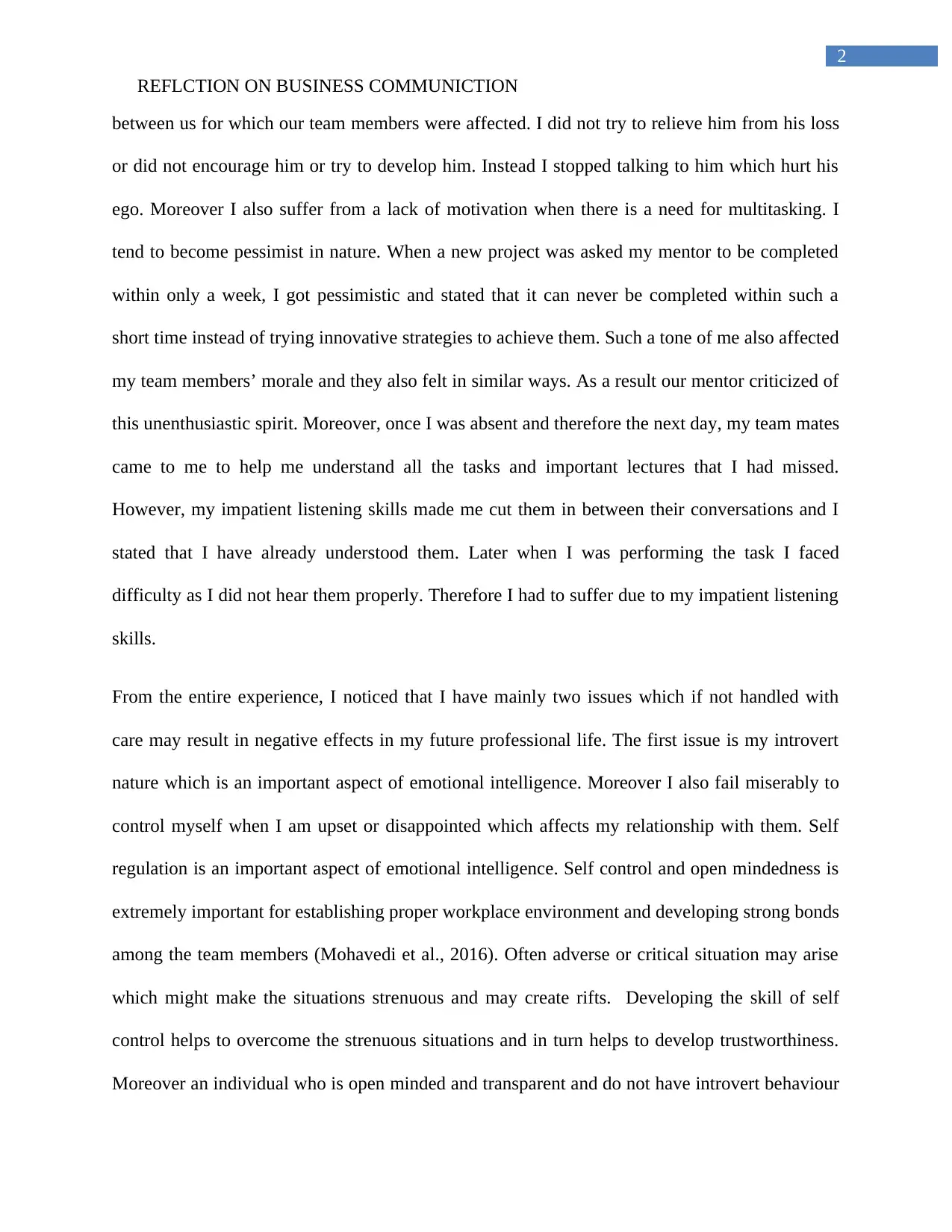
2
REFLCTION ON BUSINESS COMMUNICTION
between us for which our team members were affected. I did not try to relieve him from his loss
or did not encourage him or try to develop him. Instead I stopped talking to him which hurt his
ego. Moreover I also suffer from a lack of motivation when there is a need for multitasking. I
tend to become pessimist in nature. When a new project was asked my mentor to be completed
within only a week, I got pessimistic and stated that it can never be completed within such a
short time instead of trying innovative strategies to achieve them. Such a tone of me also affected
my team members’ morale and they also felt in similar ways. As a result our mentor criticized of
this unenthusiastic spirit. Moreover, once I was absent and therefore the next day, my team mates
came to me to help me understand all the tasks and important lectures that I had missed.
However, my impatient listening skills made me cut them in between their conversations and I
stated that I have already understood them. Later when I was performing the task I faced
difficulty as I did not hear them properly. Therefore I had to suffer due to my impatient listening
skills.
From the entire experience, I noticed that I have mainly two issues which if not handled with
care may result in negative effects in my future professional life. The first issue is my introvert
nature which is an important aspect of emotional intelligence. Moreover I also fail miserably to
control myself when I am upset or disappointed which affects my relationship with them. Self
regulation is an important aspect of emotional intelligence. Self control and open mindedness is
extremely important for establishing proper workplace environment and developing strong bonds
among the team members (Mohavedi et al., 2016). Often adverse or critical situation may arise
which might make the situations strenuous and may create rifts. Developing the skill of self
control helps to overcome the strenuous situations and in turn helps to develop trustworthiness.
Moreover an individual who is open minded and transparent and do not have introvert behaviour
REFLCTION ON BUSINESS COMMUNICTION
between us for which our team members were affected. I did not try to relieve him from his loss
or did not encourage him or try to develop him. Instead I stopped talking to him which hurt his
ego. Moreover I also suffer from a lack of motivation when there is a need for multitasking. I
tend to become pessimist in nature. When a new project was asked my mentor to be completed
within only a week, I got pessimistic and stated that it can never be completed within such a
short time instead of trying innovative strategies to achieve them. Such a tone of me also affected
my team members’ morale and they also felt in similar ways. As a result our mentor criticized of
this unenthusiastic spirit. Moreover, once I was absent and therefore the next day, my team mates
came to me to help me understand all the tasks and important lectures that I had missed.
However, my impatient listening skills made me cut them in between their conversations and I
stated that I have already understood them. Later when I was performing the task I faced
difficulty as I did not hear them properly. Therefore I had to suffer due to my impatient listening
skills.
From the entire experience, I noticed that I have mainly two issues which if not handled with
care may result in negative effects in my future professional life. The first issue is my introvert
nature which is an important aspect of emotional intelligence. Moreover I also fail miserably to
control myself when I am upset or disappointed which affects my relationship with them. Self
regulation is an important aspect of emotional intelligence. Self control and open mindedness is
extremely important for establishing proper workplace environment and developing strong bonds
among the team members (Mohavedi et al., 2016). Often adverse or critical situation may arise
which might make the situations strenuous and may create rifts. Developing the skill of self
control helps to overcome the strenuous situations and in turn helps to develop trustworthiness.
Moreover an individual who is open minded and transparent and do not have introvert behaviour
⊘ This is a preview!⊘
Do you want full access?
Subscribe today to unlock all pages.

Trusted by 1+ million students worldwide
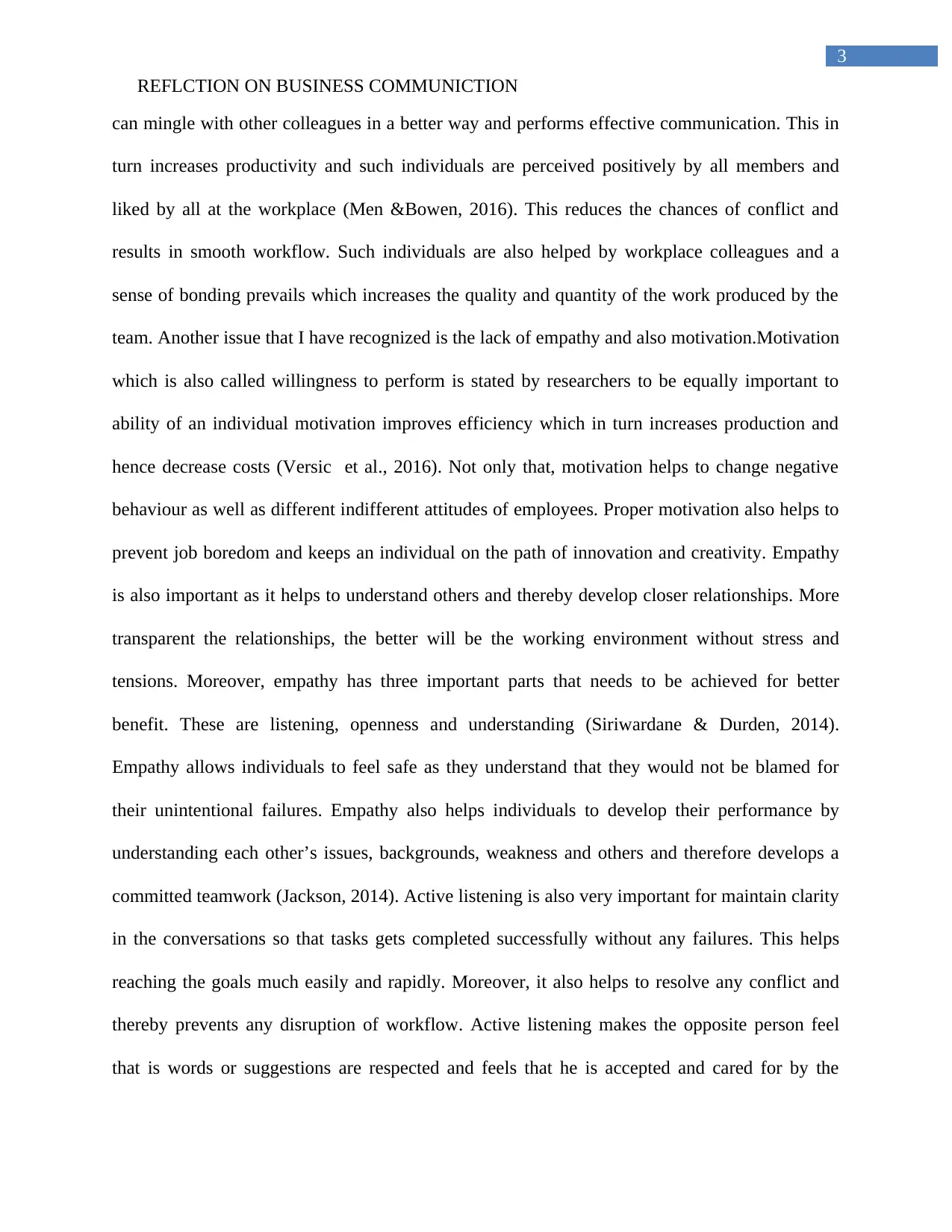
3
REFLCTION ON BUSINESS COMMUNICTION
can mingle with other colleagues in a better way and performs effective communication. This in
turn increases productivity and such individuals are perceived positively by all members and
liked by all at the workplace (Men &Bowen, 2016). This reduces the chances of conflict and
results in smooth workflow. Such individuals are also helped by workplace colleagues and a
sense of bonding prevails which increases the quality and quantity of the work produced by the
team. Another issue that I have recognized is the lack of empathy and also motivation.Motivation
which is also called willingness to perform is stated by researchers to be equally important to
ability of an individual motivation improves efficiency which in turn increases production and
hence decrease costs (Versic et al., 2016). Not only that, motivation helps to change negative
behaviour as well as different indifferent attitudes of employees. Proper motivation also helps to
prevent job boredom and keeps an individual on the path of innovation and creativity. Empathy
is also important as it helps to understand others and thereby develop closer relationships. More
transparent the relationships, the better will be the working environment without stress and
tensions. Moreover, empathy has three important parts that needs to be achieved for better
benefit. These are listening, openness and understanding (Siriwardane & Durden, 2014).
Empathy allows individuals to feel safe as they understand that they would not be blamed for
their unintentional failures. Empathy also helps individuals to develop their performance by
understanding each other’s issues, backgrounds, weakness and others and therefore develops a
committed teamwork (Jackson, 2014). Active listening is also very important for maintain clarity
in the conversations so that tasks gets completed successfully without any failures. This helps
reaching the goals much easily and rapidly. Moreover, it also helps to resolve any conflict and
thereby prevents any disruption of workflow. Active listening makes the opposite person feel
that is words or suggestions are respected and feels that he is accepted and cared for by the
REFLCTION ON BUSINESS COMMUNICTION
can mingle with other colleagues in a better way and performs effective communication. This in
turn increases productivity and such individuals are perceived positively by all members and
liked by all at the workplace (Men &Bowen, 2016). This reduces the chances of conflict and
results in smooth workflow. Such individuals are also helped by workplace colleagues and a
sense of bonding prevails which increases the quality and quantity of the work produced by the
team. Another issue that I have recognized is the lack of empathy and also motivation.Motivation
which is also called willingness to perform is stated by researchers to be equally important to
ability of an individual motivation improves efficiency which in turn increases production and
hence decrease costs (Versic et al., 2016). Not only that, motivation helps to change negative
behaviour as well as different indifferent attitudes of employees. Proper motivation also helps to
prevent job boredom and keeps an individual on the path of innovation and creativity. Empathy
is also important as it helps to understand others and thereby develop closer relationships. More
transparent the relationships, the better will be the working environment without stress and
tensions. Moreover, empathy has three important parts that needs to be achieved for better
benefit. These are listening, openness and understanding (Siriwardane & Durden, 2014).
Empathy allows individuals to feel safe as they understand that they would not be blamed for
their unintentional failures. Empathy also helps individuals to develop their performance by
understanding each other’s issues, backgrounds, weakness and others and therefore develops a
committed teamwork (Jackson, 2014). Active listening is also very important for maintain clarity
in the conversations so that tasks gets completed successfully without any failures. This helps
reaching the goals much easily and rapidly. Moreover, it also helps to resolve any conflict and
thereby prevents any disruption of workflow. Active listening makes the opposite person feel
that is words or suggestions are respected and feels that he is accepted and cared for by the
Paraphrase This Document
Need a fresh take? Get an instant paraphrase of this document with our AI Paraphraser
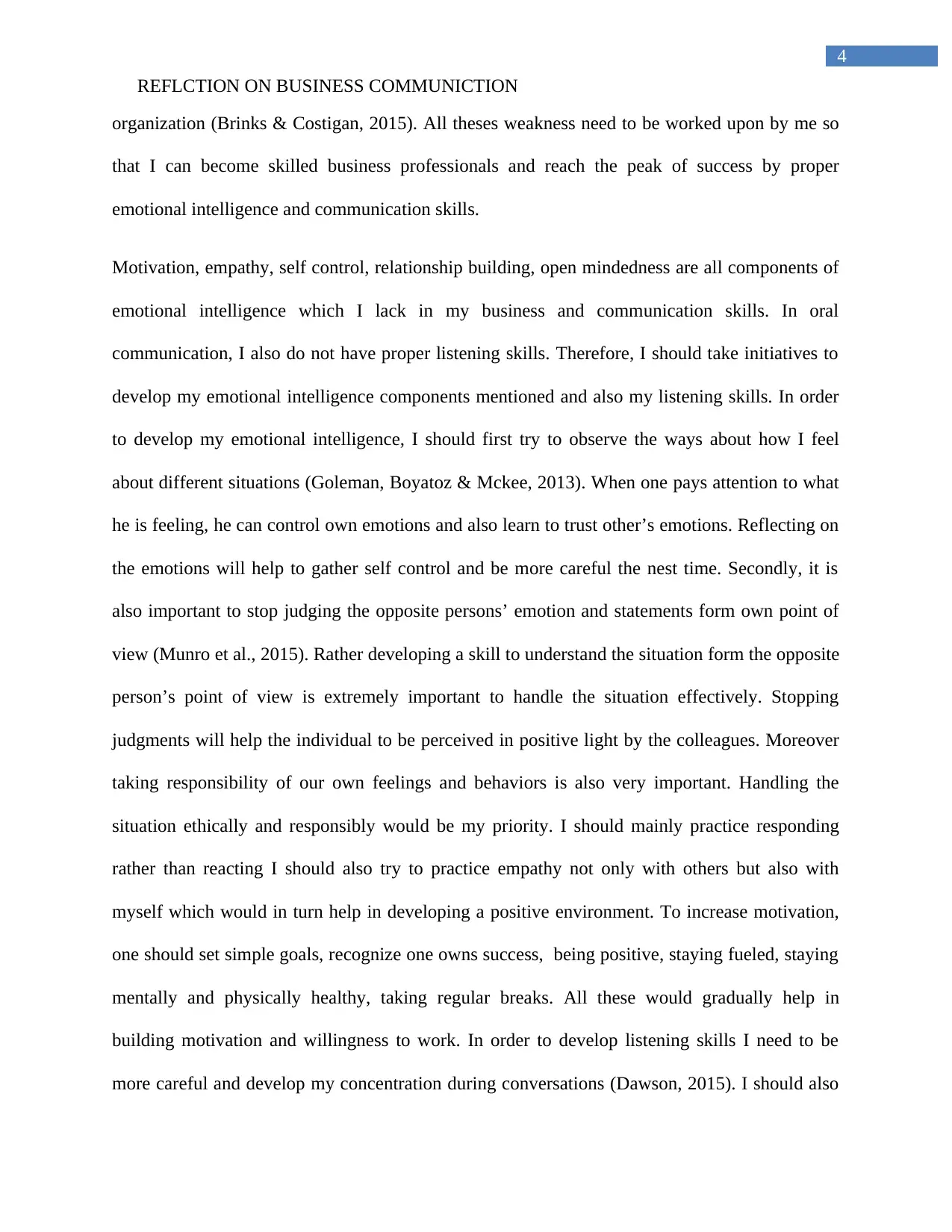
4
REFLCTION ON BUSINESS COMMUNICTION
organization (Brinks & Costigan, 2015). All theses weakness need to be worked upon by me so
that I can become skilled business professionals and reach the peak of success by proper
emotional intelligence and communication skills.
Motivation, empathy, self control, relationship building, open mindedness are all components of
emotional intelligence which I lack in my business and communication skills. In oral
communication, I also do not have proper listening skills. Therefore, I should take initiatives to
develop my emotional intelligence components mentioned and also my listening skills. In order
to develop my emotional intelligence, I should first try to observe the ways about how I feel
about different situations (Goleman, Boyatoz & Mckee, 2013). When one pays attention to what
he is feeling, he can control own emotions and also learn to trust other’s emotions. Reflecting on
the emotions will help to gather self control and be more careful the nest time. Secondly, it is
also important to stop judging the opposite persons’ emotion and statements form own point of
view (Munro et al., 2015). Rather developing a skill to understand the situation form the opposite
person’s point of view is extremely important to handle the situation effectively. Stopping
judgments will help the individual to be perceived in positive light by the colleagues. Moreover
taking responsibility of our own feelings and behaviors is also very important. Handling the
situation ethically and responsibly would be my priority. I should mainly practice responding
rather than reacting I should also try to practice empathy not only with others but also with
myself which would in turn help in developing a positive environment. To increase motivation,
one should set simple goals, recognize one owns success, being positive, staying fueled, staying
mentally and physically healthy, taking regular breaks. All these would gradually help in
building motivation and willingness to work. In order to develop listening skills I need to be
more careful and develop my concentration during conversations (Dawson, 2015). I should also
REFLCTION ON BUSINESS COMMUNICTION
organization (Brinks & Costigan, 2015). All theses weakness need to be worked upon by me so
that I can become skilled business professionals and reach the peak of success by proper
emotional intelligence and communication skills.
Motivation, empathy, self control, relationship building, open mindedness are all components of
emotional intelligence which I lack in my business and communication skills. In oral
communication, I also do not have proper listening skills. Therefore, I should take initiatives to
develop my emotional intelligence components mentioned and also my listening skills. In order
to develop my emotional intelligence, I should first try to observe the ways about how I feel
about different situations (Goleman, Boyatoz & Mckee, 2013). When one pays attention to what
he is feeling, he can control own emotions and also learn to trust other’s emotions. Reflecting on
the emotions will help to gather self control and be more careful the nest time. Secondly, it is
also important to stop judging the opposite persons’ emotion and statements form own point of
view (Munro et al., 2015). Rather developing a skill to understand the situation form the opposite
person’s point of view is extremely important to handle the situation effectively. Stopping
judgments will help the individual to be perceived in positive light by the colleagues. Moreover
taking responsibility of our own feelings and behaviors is also very important. Handling the
situation ethically and responsibly would be my priority. I should mainly practice responding
rather than reacting I should also try to practice empathy not only with others but also with
myself which would in turn help in developing a positive environment. To increase motivation,
one should set simple goals, recognize one owns success, being positive, staying fueled, staying
mentally and physically healthy, taking regular breaks. All these would gradually help in
building motivation and willingness to work. In order to develop listening skills I need to be
more careful and develop my concentration during conversations (Dawson, 2015). I should also
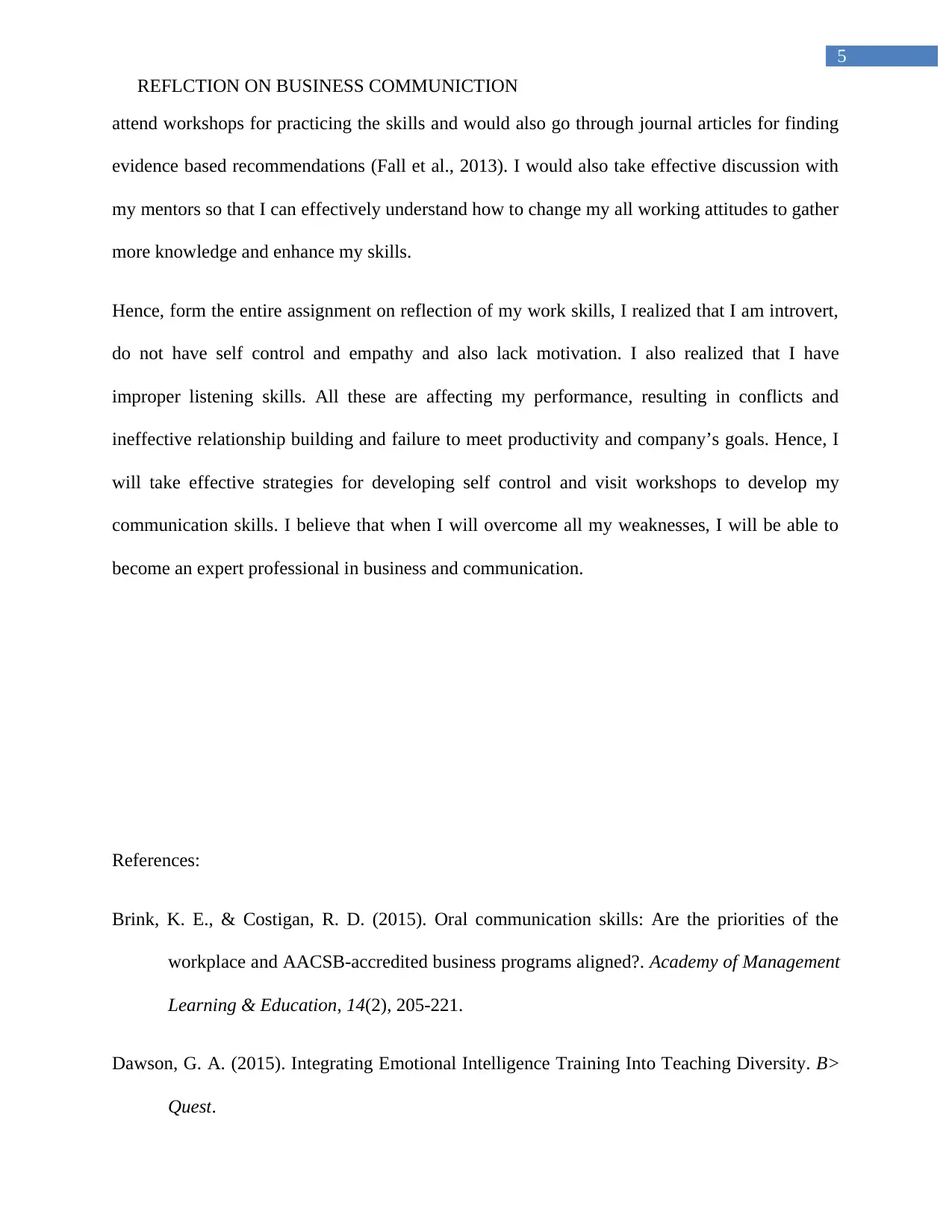
5
REFLCTION ON BUSINESS COMMUNICTION
attend workshops for practicing the skills and would also go through journal articles for finding
evidence based recommendations (Fall et al., 2013). I would also take effective discussion with
my mentors so that I can effectively understand how to change my all working attitudes to gather
more knowledge and enhance my skills.
Hence, form the entire assignment on reflection of my work skills, I realized that I am introvert,
do not have self control and empathy and also lack motivation. I also realized that I have
improper listening skills. All these are affecting my performance, resulting in conflicts and
ineffective relationship building and failure to meet productivity and company’s goals. Hence, I
will take effective strategies for developing self control and visit workshops to develop my
communication skills. I believe that when I will overcome all my weaknesses, I will be able to
become an expert professional in business and communication.
References:
Brink, K. E., & Costigan, R. D. (2015). Oral communication skills: Are the priorities of the
workplace and AACSB-accredited business programs aligned?. Academy of Management
Learning & Education, 14(2), 205-221.
Dawson, G. A. (2015). Integrating Emotional Intelligence Training Into Teaching Diversity. B>
Quest.
REFLCTION ON BUSINESS COMMUNICTION
attend workshops for practicing the skills and would also go through journal articles for finding
evidence based recommendations (Fall et al., 2013). I would also take effective discussion with
my mentors so that I can effectively understand how to change my all working attitudes to gather
more knowledge and enhance my skills.
Hence, form the entire assignment on reflection of my work skills, I realized that I am introvert,
do not have self control and empathy and also lack motivation. I also realized that I have
improper listening skills. All these are affecting my performance, resulting in conflicts and
ineffective relationship building and failure to meet productivity and company’s goals. Hence, I
will take effective strategies for developing self control and visit workshops to develop my
communication skills. I believe that when I will overcome all my weaknesses, I will be able to
become an expert professional in business and communication.
References:
Brink, K. E., & Costigan, R. D. (2015). Oral communication skills: Are the priorities of the
workplace and AACSB-accredited business programs aligned?. Academy of Management
Learning & Education, 14(2), 205-221.
Dawson, G. A. (2015). Integrating Emotional Intelligence Training Into Teaching Diversity. B>
Quest.
⊘ This is a preview!⊘
Do you want full access?
Subscribe today to unlock all pages.

Trusted by 1+ million students worldwide
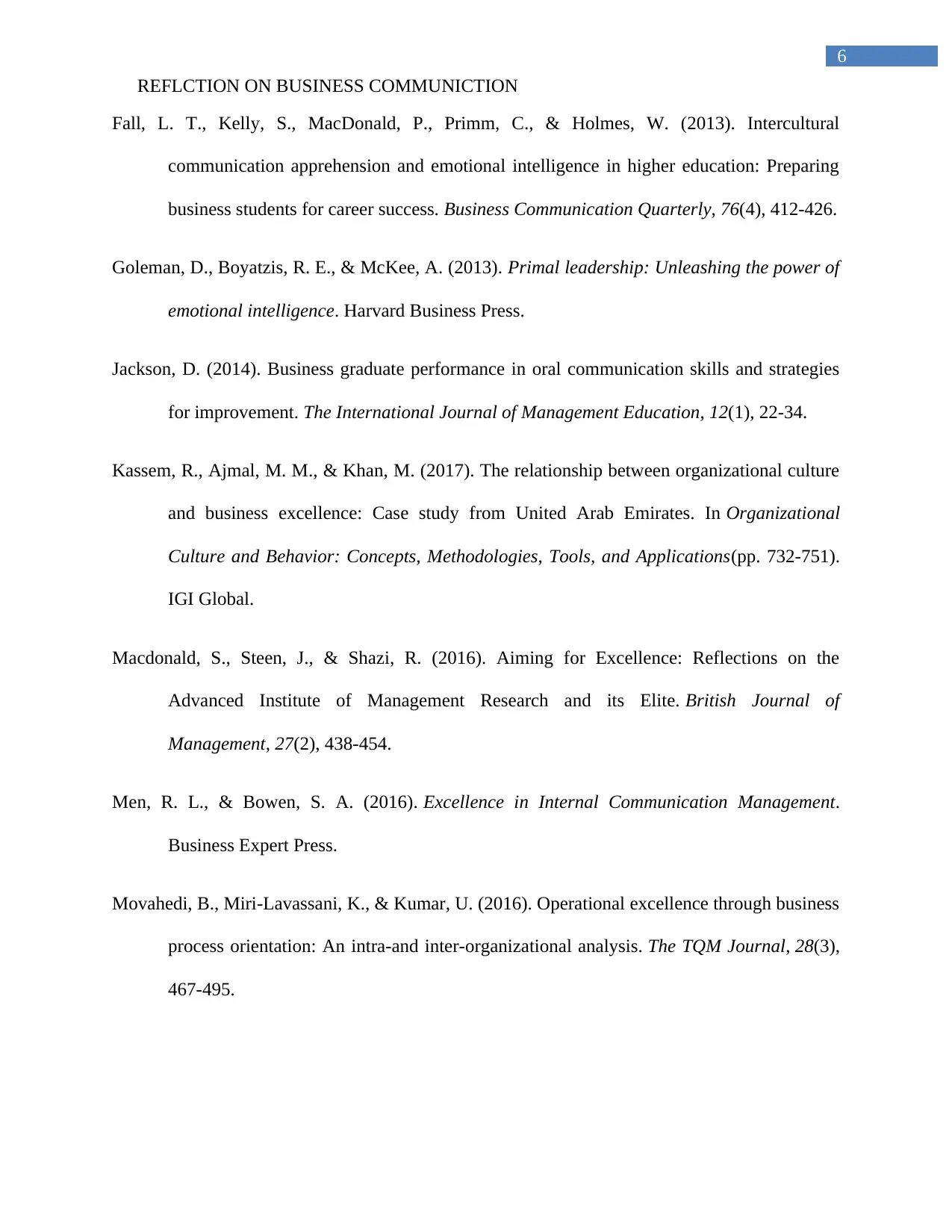
6
REFLCTION ON BUSINESS COMMUNICTION
Fall, L. T., Kelly, S., MacDonald, P., Primm, C., & Holmes, W. (2013). Intercultural
communication apprehension and emotional intelligence in higher education: Preparing
business students for career success. Business Communication Quarterly, 76(4), 412-426.
Goleman, D., Boyatzis, R. E., & McKee, A. (2013). Primal leadership: Unleashing the power of
emotional intelligence. Harvard Business Press.
Jackson, D. (2014). Business graduate performance in oral communication skills and strategies
for improvement. The International Journal of Management Education, 12(1), 22-34.
Kassem, R., Ajmal, M. M., & Khan, M. (2017). The relationship between organizational culture
and business excellence: Case study from United Arab Emirates. In Organizational
Culture and Behavior: Concepts, Methodologies, Tools, and Applications(pp. 732-751).
IGI Global.
Macdonald, S., Steen, J., & Shazi, R. (2016). Aiming for Excellence: Reflections on the
Advanced Institute of Management Research and its Elite. British Journal of
Management, 27(2), 438-454.
Men, R. L., & Bowen, S. A. (2016). Excellence in Internal Communication Management.
Business Expert Press.
Movahedi, B., Miri-Lavassani, K., & Kumar, U. (2016). Operational excellence through business
process orientation: An intra-and inter-organizational analysis. The TQM Journal, 28(3),
467-495.
REFLCTION ON BUSINESS COMMUNICTION
Fall, L. T., Kelly, S., MacDonald, P., Primm, C., & Holmes, W. (2013). Intercultural
communication apprehension and emotional intelligence in higher education: Preparing
business students for career success. Business Communication Quarterly, 76(4), 412-426.
Goleman, D., Boyatzis, R. E., & McKee, A. (2013). Primal leadership: Unleashing the power of
emotional intelligence. Harvard Business Press.
Jackson, D. (2014). Business graduate performance in oral communication skills and strategies
for improvement. The International Journal of Management Education, 12(1), 22-34.
Kassem, R., Ajmal, M. M., & Khan, M. (2017). The relationship between organizational culture
and business excellence: Case study from United Arab Emirates. In Organizational
Culture and Behavior: Concepts, Methodologies, Tools, and Applications(pp. 732-751).
IGI Global.
Macdonald, S., Steen, J., & Shazi, R. (2016). Aiming for Excellence: Reflections on the
Advanced Institute of Management Research and its Elite. British Journal of
Management, 27(2), 438-454.
Men, R. L., & Bowen, S. A. (2016). Excellence in Internal Communication Management.
Business Expert Press.
Movahedi, B., Miri-Lavassani, K., & Kumar, U. (2016). Operational excellence through business
process orientation: An intra-and inter-organizational analysis. The TQM Journal, 28(3),
467-495.
Paraphrase This Document
Need a fresh take? Get an instant paraphrase of this document with our AI Paraphraser
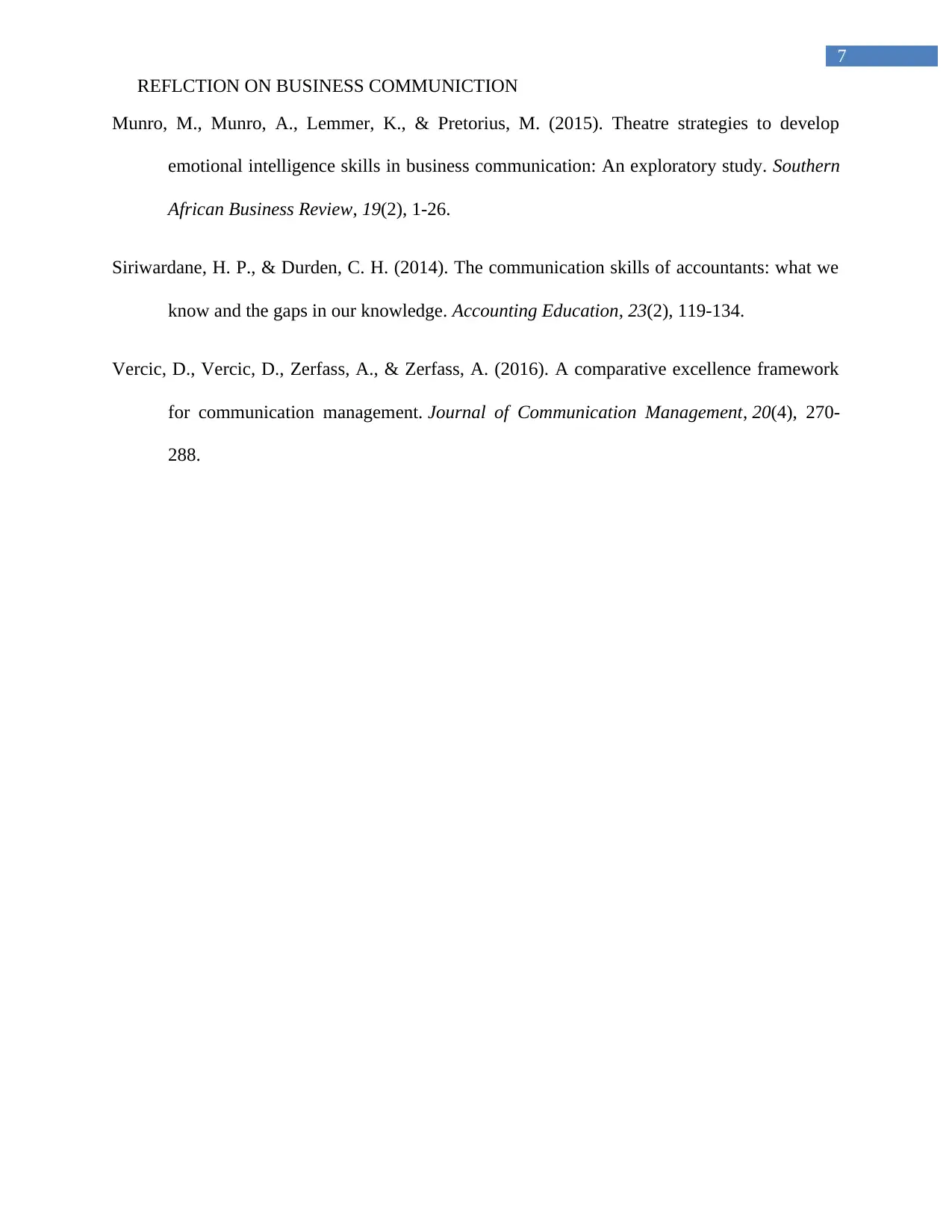
7
REFLCTION ON BUSINESS COMMUNICTION
Munro, M., Munro, A., Lemmer, K., & Pretorius, M. (2015). Theatre strategies to develop
emotional intelligence skills in business communication: An exploratory study. Southern
African Business Review, 19(2), 1-26.
Siriwardane, H. P., & Durden, C. H. (2014). The communication skills of accountants: what we
know and the gaps in our knowledge. Accounting Education, 23(2), 119-134.
Vercic, D., Vercic, D., Zerfass, A., & Zerfass, A. (2016). A comparative excellence framework
for communication management. Journal of Communication Management, 20(4), 270-
288.
REFLCTION ON BUSINESS COMMUNICTION
Munro, M., Munro, A., Lemmer, K., & Pretorius, M. (2015). Theatre strategies to develop
emotional intelligence skills in business communication: An exploratory study. Southern
African Business Review, 19(2), 1-26.
Siriwardane, H. P., & Durden, C. H. (2014). The communication skills of accountants: what we
know and the gaps in our knowledge. Accounting Education, 23(2), 119-134.
Vercic, D., Vercic, D., Zerfass, A., & Zerfass, A. (2016). A comparative excellence framework
for communication management. Journal of Communication Management, 20(4), 270-
288.
1 out of 8
Related Documents
Your All-in-One AI-Powered Toolkit for Academic Success.
+13062052269
info@desklib.com
Available 24*7 on WhatsApp / Email
![[object Object]](/_next/static/media/star-bottom.7253800d.svg)
Unlock your academic potential
Copyright © 2020–2026 A2Z Services. All Rights Reserved. Developed and managed by ZUCOL.





